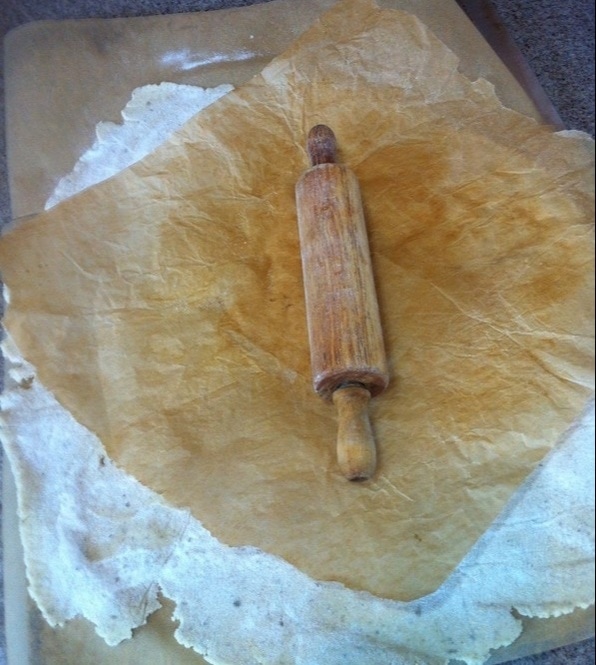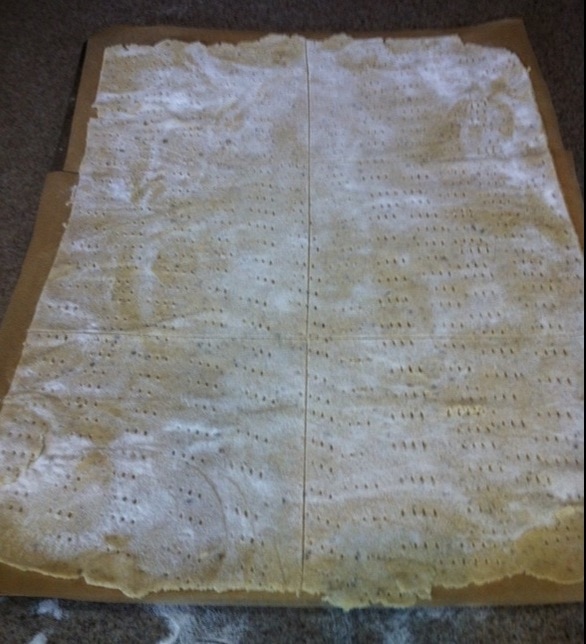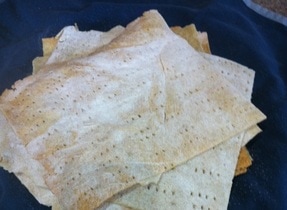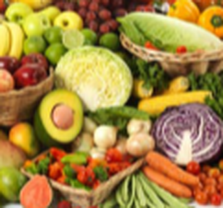I have an entire page dedicated to Passover, with recipe links and my freely downloadable Haggadah for Holistic Nonviolence on this page.
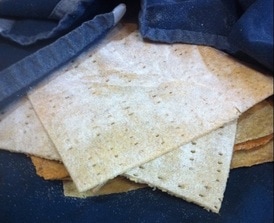
Writing this post is presenting some additional challenges. I just pulled a tray of these Matzahs from the oven, and although I was able to restrain myself from eating them long enough to take a few photos of my finished product, I can't seem to stop eating them now, which is making typing this post harder than usual.
After several disappointing attempts, I finally came up with something that not only tastes good and stays together, but also remains fairly flat instead of having the edges curl up after baking. I've been making all sorts of oil-free crackers for many years, but none of them so far would work as a substitute for matzah because they just didn't look the part at all.
Now I should warn you --what I have created here, would not pass muster with any Orthodox rabbi in terms of being kosher for Passover -- a special type of kosher that involves a lot of additional rules, like for example you have under 18 minutes from the time you mix the flour with water before you get it into a hot oven -- otherwise yeast might start to grow and cause the matzah to be leavened. Furthermore It is a mitzvah -- in fact a commandment, to eat properly made matzah on the first night of Passover, but to fulfill this, matzah must be made of one of these five grains -- wheat, spelt, barley, rye or oats. No exceptions. Some people who are gluten intolerant do eat oats -- if they are grown, handled, and processed to prevent cross contamination. But others do not. For very observant Jews, who are gluten intolerant and don't eat oats, this presents a conundrum that I do not have a solution for. But for those, who want to honor the spirit of Passover by having seders, and retelling the story of liberation from slavery -- and aren't concerned with following all those rules, my recipe may be just the thing you were looking for to make your seder inclusive for those who don't consume gluten. It's actually a very simple recipe, but does take time to roll out the dough thinly. This recipe makes six large crackers -- or one big tray (15 x 20 inches). So you might wish to double it.
After several disappointing attempts, I finally came up with something that not only tastes good and stays together, but also remains fairly flat instead of having the edges curl up after baking. I've been making all sorts of oil-free crackers for many years, but none of them so far would work as a substitute for matzah because they just didn't look the part at all.
Now I should warn you --what I have created here, would not pass muster with any Orthodox rabbi in terms of being kosher for Passover -- a special type of kosher that involves a lot of additional rules, like for example you have under 18 minutes from the time you mix the flour with water before you get it into a hot oven -- otherwise yeast might start to grow and cause the matzah to be leavened. Furthermore It is a mitzvah -- in fact a commandment, to eat properly made matzah on the first night of Passover, but to fulfill this, matzah must be made of one of these five grains -- wheat, spelt, barley, rye or oats. No exceptions. Some people who are gluten intolerant do eat oats -- if they are grown, handled, and processed to prevent cross contamination. But others do not. For very observant Jews, who are gluten intolerant and don't eat oats, this presents a conundrum that I do not have a solution for. But for those, who want to honor the spirit of Passover by having seders, and retelling the story of liberation from slavery -- and aren't concerned with following all those rules, my recipe may be just the thing you were looking for to make your seder inclusive for those who don't consume gluten. It's actually a very simple recipe, but does take time to roll out the dough thinly. This recipe makes six large crackers -- or one big tray (15 x 20 inches). So you might wish to double it.
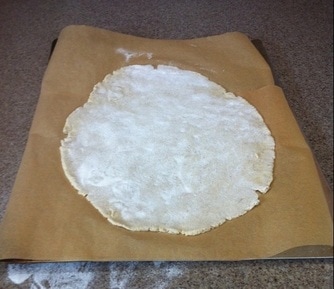 Use a large cookie tray. This one is 15 x 20 inches
Use a large cookie tray. This one is 15 x 20 inches Ingredients:
1/2 cup raw sunflower seeds
1/2 cup garbanzo bean flour
1/4 cup tapioca flour
1/4 cup + 1/2 cup white rice flour
additional rice flour for rolling out dough
1/2 cup water
2 TBS ground golden flax seeds
1/4 tsp guar gum
Unbleached parchment paper
1/2 cup raw sunflower seeds
1/2 cup garbanzo bean flour
1/4 cup tapioca flour
1/4 cup + 1/2 cup white rice flour
additional rice flour for rolling out dough
1/2 cup water
2 TBS ground golden flax seeds
1/4 tsp guar gum
Unbleached parchment paper
Directions:
I think these taste great without adding any salt, but if you are used to a fair amount of salt, you might want to sprinkle some salt on these right before putting them into the oven.
I also think they taste best right out of the oven -- but have found that several days later, you can reheat them in the oven right before serving them and they are just as good.
- Take the sunflower seeds and put them into a blender and grind them into a powder. Then transfer the ground sunflower seeds to a large bowl
- Add the garbanzo bean flour, tapioca and 1/4 cup of the rice flour and mix well with a wire whisk.
- Place the water and flax seeds into a blender (preferably a small blender jar if you have one) and blend on high until well mixed. Then add the guar gum and blend until it becomes thick like egg white. Add this to the bowl of flours and mix well with a fork.
- Sprinkle the remaining 1/2 cup of rice flour over the mixture to keep it from sticking to your hands, and use your hands to roll the mixture into a nice ball of dough -- continuing to press it into the loose rice flour as needed to keep it from being sticky.
- Once the dough is well-worked and not sticky, flatten it slightly into a pancake on the counter and sprinkle both sides with a bit more flour so that it won't stick to the counter. Continue flattening it with your hands like this and turning it over and flouring the other side until it is a flat circle about the size of a small plate. Then transfer it a large cookie tray that is lined with parchment paper. Sprinkle a bit more flour over the top and the place a second sheet of parchment over the top and use a rolling pin on top of that to flatten the dough out as thin as you can until it covers the entire cookie tray. Continue to move the top parchment sheet around -- and sprinkle flour as needed to keep it from sticking. Once you have a nice thin flat rectangle, use a fork to stab the entire surface about two hundred times or so. Then use a knife to score the matzah into six large crackers.
- Place the matzah into the middle of an oven preheated to 450 degrees. and bake it for about 13-15 minutes -- just until it starts to firm up, but has not yet browned. Remove from oven and let cool completely before storing in a a plastic bag. If making many days ahead, of when you plan to use it, keep it in the refrigerator.
I think these taste great without adding any salt, but if you are used to a fair amount of salt, you might want to sprinkle some salt on these right before putting them into the oven.
I also think they taste best right out of the oven -- but have found that several days later, you can reheat them in the oven right before serving them and they are just as good.
One final note I'd like to add is that some traditions consider legumes and rice to be verboten during Passover. The Chabad website has written about this subject Here. But I am troubled by this perspective.
In essence as I understand this, back about 800 or so years ago, some rabbis got the idea, that out of an abundance of caution, beans and rice and other healthy plant-deprived foods that are clearly NOT chometz (one of the five special leavened grains) should be avoided on Passover. This tradition took hold in some, but not all geographic areas, and has now become a source of division amongst Jews from different places.
It appears to me that Chabad's only concern about this custom is the fact that it divides Jews. But they completely ignore an important problem here, namely that this custom has the additional consequence of encouraging and increasing consumption of meat, dairy and eggs (all of which they do consider Kosher for Passover).
There are several problems with this:
1) Environmental organizations have stated that animal agriculture is a major cause of the most serious environmental problems facing humanity today,
2) In order to obtain meat, dairy and eggs, humans must engage in the practice of making other beings into, "chattel property" and "owning" them, which seems contrary to the spirit of Passover.
3) Eating meat, dairy and eggs, has been clearly shown to contribute to heart disease, high blood pressure, diabetes, and many cancers -- the leading causes of death and disability in the Western world today.
4) Rearing animals for food, means large amounts of grain and beans get fed to animals -- a very inefficient use of resources (it takes many pounds of grain to produce a single pound of meat) contributing to food insecurity for the poorest humans, while 70% of grain grown is for animal feed. Also while many areas of the US experience drought, the major use of water is for animal agriculture.
I think it is time that Jews speak up, and encourage religious leaders to address this glaring hypocrisy that undermines many of the important ideas that Torah appears to embrace: feeding the hungry, healing the world, protecting human health, compassion for animals, and taking care of G-d's creation.
In essence as I understand this, back about 800 or so years ago, some rabbis got the idea, that out of an abundance of caution, beans and rice and other healthy plant-deprived foods that are clearly NOT chometz (one of the five special leavened grains) should be avoided on Passover. This tradition took hold in some, but not all geographic areas, and has now become a source of division amongst Jews from different places.
It appears to me that Chabad's only concern about this custom is the fact that it divides Jews. But they completely ignore an important problem here, namely that this custom has the additional consequence of encouraging and increasing consumption of meat, dairy and eggs (all of which they do consider Kosher for Passover).
There are several problems with this:
1) Environmental organizations have stated that animal agriculture is a major cause of the most serious environmental problems facing humanity today,
2) In order to obtain meat, dairy and eggs, humans must engage in the practice of making other beings into, "chattel property" and "owning" them, which seems contrary to the spirit of Passover.
3) Eating meat, dairy and eggs, has been clearly shown to contribute to heart disease, high blood pressure, diabetes, and many cancers -- the leading causes of death and disability in the Western world today.
4) Rearing animals for food, means large amounts of grain and beans get fed to animals -- a very inefficient use of resources (it takes many pounds of grain to produce a single pound of meat) contributing to food insecurity for the poorest humans, while 70% of grain grown is for animal feed. Also while many areas of the US experience drought, the major use of water is for animal agriculture.
I think it is time that Jews speak up, and encourage religious leaders to address this glaring hypocrisy that undermines many of the important ideas that Torah appears to embrace: feeding the hungry, healing the world, protecting human health, compassion for animals, and taking care of G-d's creation.
